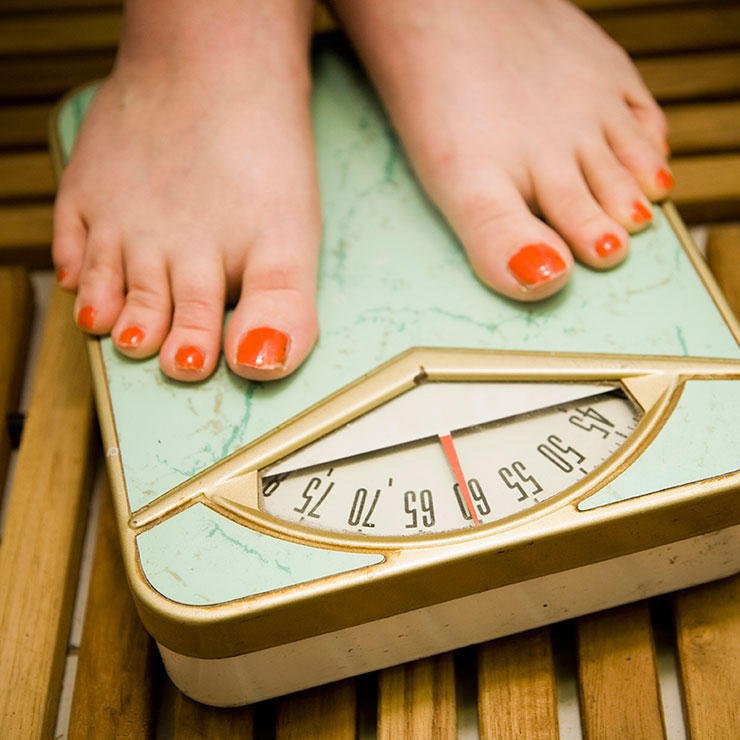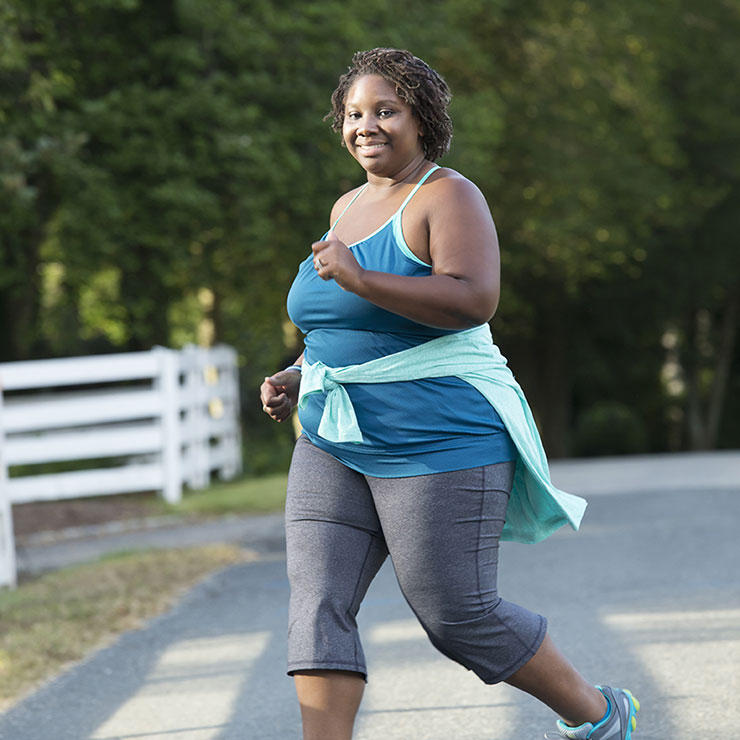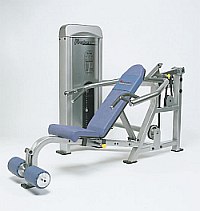The steeper the mountain, the more difficult the first step is. And if you're carrying a lot of extra weight, taking that first step toward a healthier lifestyle can be especially daunting. (Burn calories and build muscle—all while boosting your mood—with our 21-Day Walk a Little, Lose a Lot Challenge!)
"I think people who've never been overweight don't understand how intimidating it can be to start losing weight," says Louise Green, a trainer, fitness writer, and founder of Canada's Body Exchange exercise programs and retreats, which are designed for a plus-sized clientele.
Green has some encouraging words, however: She's found that many overweight or obese people are much stronger than they realize. "There's a lot of fear surrounding fitness," she says. "But you're more capable then you assume."
Here, she and other experts outline the best ways to get motivated and get started for those looking to lose 50 pounds or more.
1. Hide your bathroom scale.
 2/7
1. Hide your bathroom scale.
2/7
1. Hide your bathroom scale.
Getting the weight off—and keeping it off—is a slow process, Green says. Watching the number on a scale can be depressing. Plus, if you're focused on losing a set number of pounds in a specific amount of time, missing that goal can wreck your motivation. "Some people are just born bigger, and they won't be able to lose a lot of weight without taking unhealthy, unsustainable measures when it comes to diet or exercise," Green adds. For those reasons, she says losing weight should be a secondary benefit to your overall health gains—not your primary goal.
2. That’s right: Focus on your health.
 3/7
2. That’s right: Focus on your health.
3/7
2. That’s right: Focus on your health.
Train your attention on how you feel, advises Michelle Steinke, founder of One Fit Widow. Steinke rededicated herself to health and lost 80 pounds after the tragic death of her husband. When you're physically active, you have more energy and you feel better about yourself, she says. "Enjoy the sensations of being active and strong," Green says. Instead of feeling like you're suffering through some kind of weight-loss boot camp, you'll actually relish the time you spend exercising.
3. Drink more water.
 4/7
3. Drink more water.
4/7
3. Drink more water.
If you set the bar too high, you're setting yourself up for failure, says Dyan Tsiumis, founder of GET FIERCE Training in New York. Tsiumis, who once weighed 190 pounds, dropped more than 70 lbs from her petite frame. "I often have my clients start by drinking two liters of water every day for a month," she says. "They're amazed at how good they feel." By starting with modest goals, you can avoid the pitfalls of burnout or the debilitating repercussions of missing your targets.
4. Find your happy place.
 5/7
4. Find your happy place.
5/7
4. Find your happy place.
"If you aren’t comfortable with your workout space, you won't exercise," Tsiumis says. Green believes feeling comfortable with your trainer is equally important. "Trainers who aren't used to working with overweight clients will often recommend exercise or programs that aren't right for their clients' bodies, and can even be painful," Green says. In the beginning, exercising at home or walking in your neighborhood may remove some of the anxiety of working out in a typical gym setting. Finding a workout buddy or a support community online is another great way to make exercise more inviting, Green says. (And check out our new Fit in 10 DVD—it's designed to help get you strong and slim with 10-minute daily workouts. And it works!)
5. Make a plan.
 6/7
5. Make a plan.
6/7
5. Make a plan.
Scheduling your day ahead of time makes it easier to stick to your goals, Steinke says. "Start every day or every week by putting your schedule in order, and make training or exercise a non-negotiable part of that schedule," she advises. (Check out these 31 simple ways to never skip another workout.) "I have an alarm that goes off three times a day," Tsiumis says. "They're reminders for those times when I know I'll need them—when I'm hungry and might slip, or tired and might skip a workout, or I just need a little inspiration."
6. Walk, don't run.
 7/7
6. Walk, don't run.
7/7
6. Walk, don't run.
"Walking is the number one exercise if you're overweight," Green says. "Running can hurt, but walking isn't jarring or tough on joints." Also, almost anyone can find time for 20 minutes of walking a few days a week—making that a great starting point when you're trying to adopt a healthier lifestyle. "We tend to think that exercise has to be extreme to be effective, but that's not true," Green adds. "Just a little extra walking every day can have a huge benefit, and can change people's lives."
- Prev:10 Rules To Live By For Long-Lasting Weight Loss
- Next:8 Things That Happen When You Finally Stop Drinking Diet Soda
 2/7
1. Hide your bathroom scale.
2/7
1. Hide your bathroom scale.
 3/7
2. That’s right: Focus on your health.
3/7
2. That’s right: Focus on your health.
 4/7
3. Drink more water.
4/7
3. Drink more water.
 5/7
4. Find your happy place.
5/7
4. Find your happy place.
 6/7
5. Make a plan.
6/7
5. Make a plan.
 7/7
6. Walk, don't run.
7/7
6. Walk, don't run.




